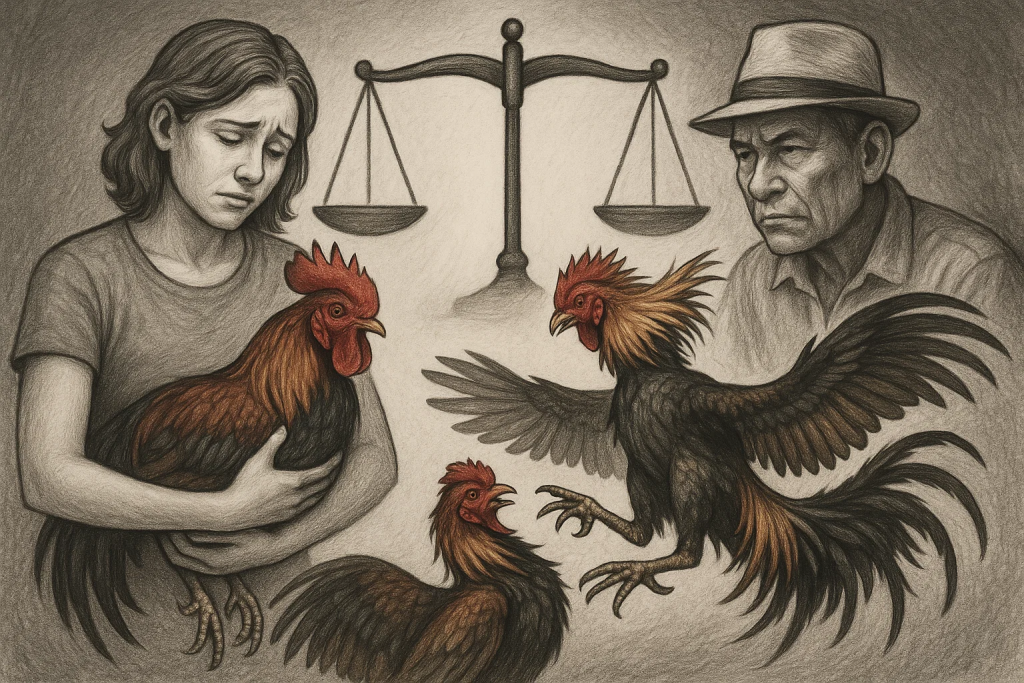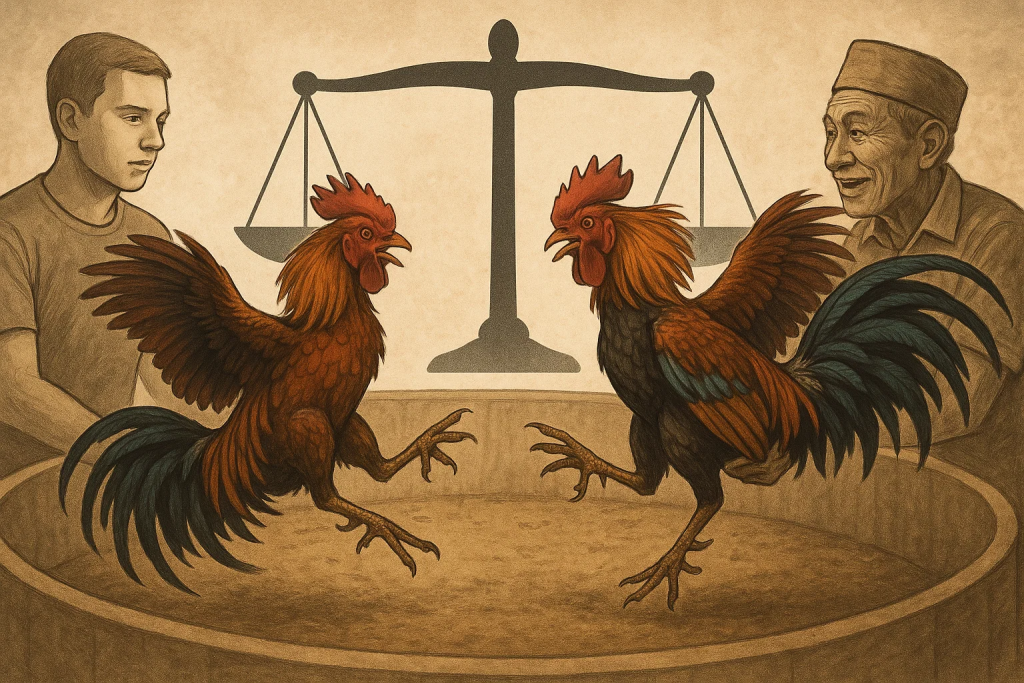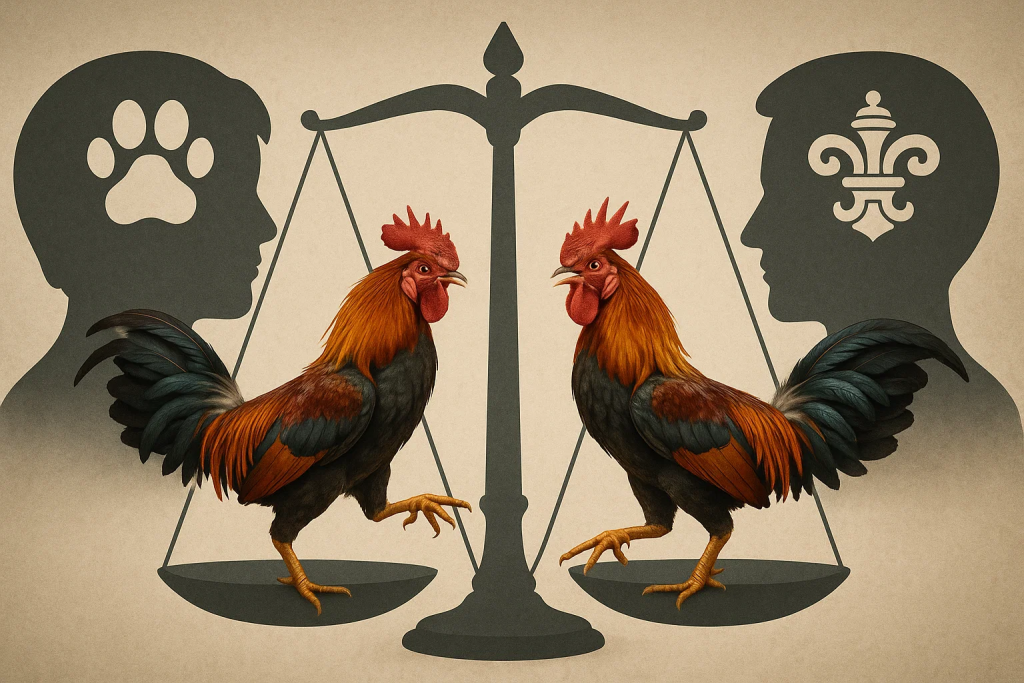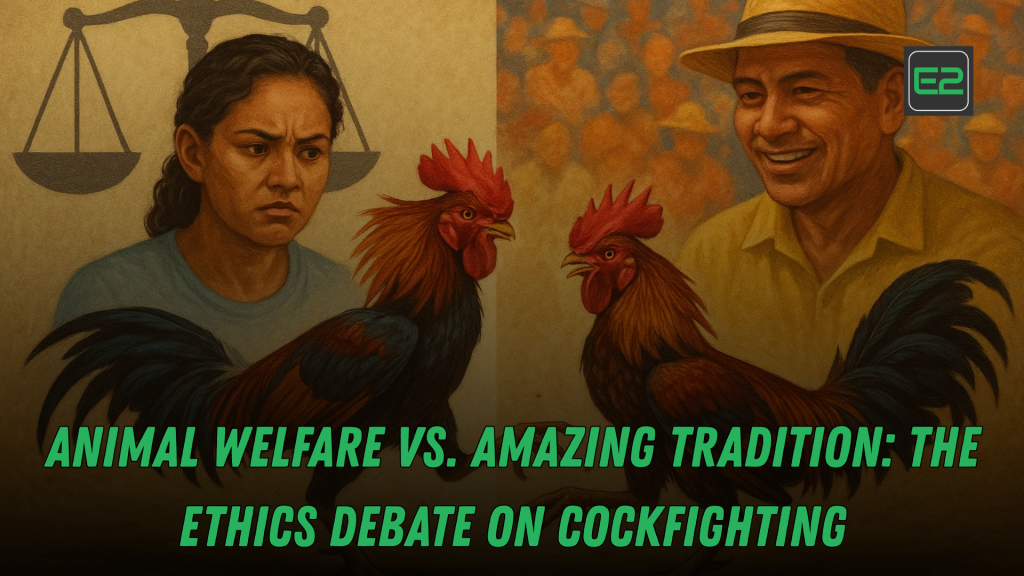The debate over the ethics of cockfighting is increasingly stirring controversy, especially in light of growing concerns over animal welfare. Cockfighting, known as sabong in the Philippines, has long been considered an integral part of cultural traditions and social gatherings. The practice involves two roosters fighting in a controlled environment, often with bettors placing wagers on the outcome, while it’s seen by many as an exciting spectacle and a rich part of tradition
This article dives into the ongoing debate between preserving cultural traditions and advocating for animal rights. It examines the arguments from both sides, explores the legal landscape surrounding cockfighting, and considers the ethical implications of this age-old practice.
Table of Contents
The Historical and Cultural Significance of Cockfighting
A Traditional Sport with Deep Roots
Cockfighting dates back thousands of years and has been practiced in many cultures around the world. In the Philippines, it holds a particularly prominent place. Sabong has historically been a form of entertainment, a social gathering, and even a way to build community bonds. Many local festivals, like Pista ng Sabong, still feature cockfights as a highlight, drawing large crowds.
For some, cockfighting represents not just a sport, but a cultural heritage. It is tied to Filipino identity, family traditions, and community ties. Many Filipinos view the practice as an important expression of their customs and values. It provides income opportunities for breeders and organizers and supports local economies. Betting on cockfights also contributes to the local gambling culture, which is part of social gatherings for many families.

The Role of Cockfighting in Local Communities
In addition to its cultural relevance, cockfighting plays a role in community dynamics. Small towns and villages often host cockfighting events that draw people together, providing a sense of belonging and a form of local pride. For some, it’s an opportunity to showcase their prized roosters, which are raised with meticulous care and breeding, elevating them to positions of status.
However, as global awareness of animal rights grows, the widespread practice of cockfighting is increasingly being scrutinized.
Animal Welfare Concerns: The Ethical Dilemma
The Case Against Cockfighting
On the other side of the debate are animal rights activists and welfare groups who argue that cockfighting is inherently cruel. Their primary concern revolves around the physical and psychological harm inflicted on the roosters involved. These animals are often subjected to brutal conditions, including:
- Physical injury: Roosters are typically equipped with sharp blades on their legs to enhance the danger of the fight, leading to severe injuries, including deep cuts, broken wings, and even death.
- Stress and trauma: The intense environment of the cockfighting arena, filled with loud noises, flashing lights, and spectators, causes significant stress for the roosters. The psychological impact is also a factor, as the birds are often kept in isolation and subjected to unnatural conditions before the fight.
- Shortened lifespans: Even when roosters survive the fight, their lives are often short-lived due to the physical toll inflicted during these matches.
These issues have led many to conclude that cockfighting is an inhumane practice that should be banned to protect animal welfare.
Legal and Global Perspectives (Animal Welfare)
Many countries, including those in the European Union, the United States, and Australia, have banned cockfighting altogether, deeming it unacceptable. In the Philippines, cockfighting is still legal under regulated conditions, but there have been calls for stronger animal protection laws.
The Philippine government has faced mounting pressure from international bodies and advocacy groups, urging it to reconsider the tradition of cockfighting. Advocates for change argue that times have changed and that cultural practices should evolve to reflect modern ethical standards, which include valuing the lives and welfare of animals.

The Legal Landscape: Is Change Possible?
Philippine Law and Regulation
In the Philippines, cockfighting is legal but is regulated under the Cockfighting Law of 1974. The law allows cockfighting in designated cockpits and at specific times of the year, provided that it is regulated and that the fights are monitored for safety.
However, illegal cockfighting operations are a significant concern. Despite the regulations, underground cockfights continue to thrive, often evading law enforcement. These illegal events are more dangerous for the animals involved, as they are often conducted without oversight and with little regard for safety or well-being.
Recent Developments and Public Debate
In recent years, the debate on the ethics of cockfighting has grown louder, with many advocating for a ban. Efforts to ban or heavily regulate cockfighting have faced resistance, particularly from those who see the sport as an irreplaceable cultural tradition. While some lawmakers push for a more humane approach, there is also a significant portion of the population that wants to preserve cockfighting as part of the nation’s identity.
One of the more recent developments in the debate was the temporary shutdown of online sabong (e-sabong) in the Philippines due to concerns over its impact on gambling addiction and illegal betting. This event highlighted the growing scrutiny of the broader industry of cockfighting and its potential future in the country.
Absolute E-Sabong Shutdown: What Happened and Why It Rocked the Industry
The Ethical Question: Tradition vs. Animal Welfare
The conflict between tradition and animal welfare is central to the ethics of cockfighting. Proponents of cockfighting argue that it is a long-standing part of Filipino culture, and banning it would be an attack on their traditions and way of life. On the other hand, animal welfare advocates argue that cultural practices must evolve and adapt to modern ethical standards, especially when they involve harm to animals.
Can Tradition Evolve?
The challenge lies in finding a balance between maintaining cultural traditions and ensuring that practices align with modern views on ethics and animal rights. This debate is not unique to the Philippines—around the world, similar discussions are taking place about the ethics of traditional practices that harm animals, such as bullfighting in Spain or whale hunting in Japan.
One possible solution is reforming cockfighting by imposing stricter regulations that prioritize animal welfare. Some advocates suggest transitioning cockfighting from blood sports to more humane events, such as non-violent exhibitions or shows that highlight the roosters’ skills without engaging them in physical combat.

The Path Forward
The debate over cockfighting in the Philippines is far from over. The push for stronger animal welfare laws continues to face opposition from those who view the practice as a vital cultural tradition. However, as awareness of animal rights grows, it becomes increasingly important for society to have an open and honest conversation about the ethics of this practice.
While tradition holds significant value, modern ethical standards demand that we reconsider practices that cause harm to living creatures. The future of cockfighting in the Philippines may depend on finding a way to honor tradition while ensuring that the welfare of animals is safeguarded.
Cockfighting, or sabong, is a long-standing tradition in the Philippines, deeply ingrained in the culture as a form of entertainment and community gathering. However, the ethical debate surrounding the practice is intensifying due to concerns over animal welfare. While supporters argue that it is an important part of Filipino heritage, opponents highlight the cruelty involved, including physical injuries and stress inflicted on the roosters.
In the Philippines, cockfighting is legal but regulated, with concerns over illegal cockfighting operations still prevalent. Animal rights activists advocate for stricter regulations or an outright ban, suggesting reforms such as transitioning to more humane exhibitions. The debate presents a challenge between preserving tradition and evolving to meet modern ethical standards, with no clear resolution in sight. As public awareness of animal welfare grows, finding a balance between cultural preservation and ethical treatment of animals remains a crucial issue.
If you are passionate about animal welfare and cultural preservation, it is crucial to continue engaging in this conversation and advocating for reforms that can create a more ethical future for both humans and animals.
Frequently Asked Questions
1. Is cockfighting legal in the Philippines?
Yes, cockfighting is legal in the Philippines under regulated conditions, but illegal cockfighting still occurs in underground events.
2. What are the animal welfare main concerns about cockfighting?
The main concerns include animal cruelty, such as physical injuries to the roosters, stress, trauma, and the overall inhumane treatment of animals involved in the sport.
3. Why is cockfighting important to Filipino culture?
Cockfighting has deep cultural roots in the Philippines and is considered a traditional form of entertainment, social gathering, and even a livelihood for some communities.
4. What is the current legal stance on cockfighting in the Philippines?
Cockfighting is regulated by the government, but there are calls for stricter regulations or a potential ban due to concerns over animal welfare and illegal activities surrounding the sport.
5. How can cockfighting practices be reformed?
Reforming cockfighting could involve banning harmful elements like animal combat and transitioning to more humane exhibitions or non-violent events, ensuring animal welfare is prioritized.
